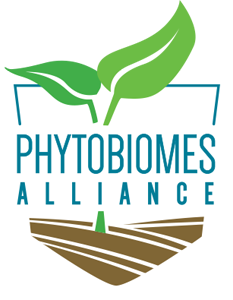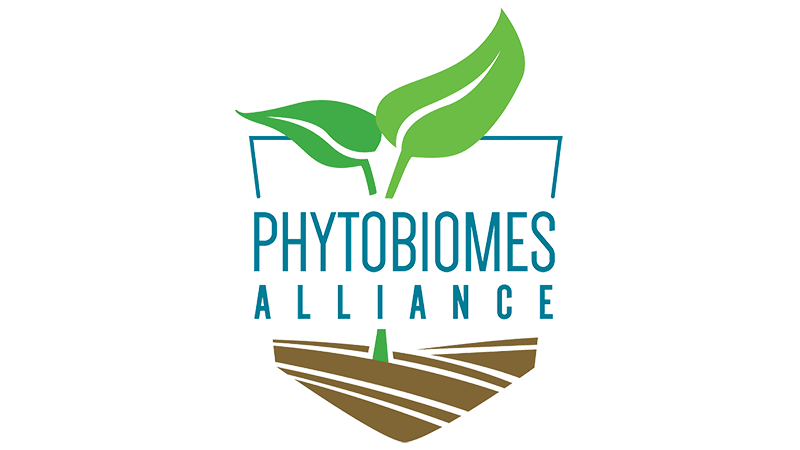
Phytobiomes Alliance Newsletter – February 2021
Projects
Genome-based circumscription and phenotyping of regulated microbes
(funded by the USDA Animal Plant Health Inspection Service – APHIS).
The Alliance-coordinated project began in August 2019 and focuses on the select agent Ralstonia solanacearum (Rs). Due to delays related to COVID-19, the project is expected to be completed in August 2021.Through this project, a classification system based on whole genome sequences that was developed by Boris Vinatzer and Linwood Heath of Virginia Tech is used to precisely identify microbes and conclusively distinguish pathogenic and non-pathogenic Rs strains. Over the long-term and once expanded beyond Rs, this method will be beneficial for accelerating the regulatory pathway for international and interstate shipments as well as commercialization of microbial products. Other project partners include: University of Wisconsin-Madison, Iowa State University, USDA-APHIS, and University of Hawaii. Project page
SUCSEED – Stop the use of pesticides on seeds
(funded by Agence National de la Recherche (ANR), France)
This 6-year project coordinated by Alliance Coordinating Committee member Matthieu Barret (INRAE) started in January 2021. The project intends to establish the seed as a central player in next-generation crop health management in favor of a more sustainable agriculture. It focuses on two major phytosanitary problems: seed-transmitted pathogens and damping-off of four different crop species (i.e. wheat, tomato, common bean and rapeseed) and their most commonly associated pathogens. Project page
Artificial Intelligence Institute for Microbiome Biology
(submitted to US National Science Foundation)
The Phytobiomes Alliance supported a proposal to establish the AI Institute for Microbiome Biology (AIMB) under the leadership of Feng Luo of Clemson University. If funded, AIMB will lead AI innovation and advance microbiome biology by 1) making the microbiome domain a driver for AI; 2) catalyzing community-wide AI- enabled microbiome research; 3) nurturing a diverse interdisciplinary workforce, especially from underrepresented groups; and 4) serving as a leader in knowledge transfer. The Phytobiomes Alliance will link industry partners with the AIMB for the purpose of exploring new opportunities of AI to advance the microbiome industry.
US Culture Collection Research Coordination Network
(in preparation for submission to US National Science Foundation)
One of the priorities for the Alliance since its founding has been to develop a census of microbes and to identify potential collections that could be used for microbiome research projects and potential microbial products. In Spring 2021, a proposal will be submitted for phase 2 of the United States Culture Collection Network (USCCN) with the goal of expanding the scope and reach of the network to gain increased awareness and access to microbial collections of all sizes, from research collections to back-up collections. If funded, the Phytobiomes Alliance will provide project management, logistics and communications, and the necessary tools to accomplish specific tasks and goals.
Standards Development
The Alliance is involved in multiple efforts related to the development of standards ranging from microbial sequencing to microbiome studies to regulatory requirements. In the APHIS supported sequence-based classification project, we will be developing for consideration by APHIS a metadata checklist of relevant phenotypic and geographic data, SOPs, and guidelines for using genome-based classification for circumscription of regulated bacteria. The Phytobiomes Alliance is also working directly with several projects through which a variety of standards will be developed, including EU CIRCLES, EU MASTER, EU MicrobiomeSupport, and the US Agricultural Microbiome Research Coordination Network. The Alliance is also in discussions with regulators from various countries/regions including, but not limited to, the EU, Ireland, and the US.
Publications
Through the direct involvement of Kellye Eversole and other members of the scientific Coordinating Committee, the Alliance participated in the development of publications related to standards and priorities for microbiome research:
- Ryan, M. J., M. Schloter, G. Berg, L. L. Kinkel, K. Eversole, J. A. Macklin, D. Rybakova and A. Sessitsch (2021). Towards a unified data infrastructure to support European and global microbiome research: a call to action. Environmental Microbiology 23(1): 372-375.
- Ryan, M.J., Schloter M., Berg, G., Kostic, T., Kinkel, L.L., Eversole, K., Macklin, J.A., Schelkle, B., Kazou, M., Sarand, I., Singh, B.K., Fischer, D., Maguin, E., Ferrocino, I., Lima, N.,McClure, R.S., Charles, T.C., de Souza, R.S.C., Kiran, G.S., Krug, H.L, Taffner, L., Roume, H., Selvin, J., Smith, D., Rybakova, D., and Sessitsch, A. (2021). Development of Microbiome Biobanks – Challenges and Opportunities. Trends in Microbiology 29(2): 89-92.
- Gabriele Berg, Daria Rybakova, Doreen Fischer, Tomislav Cernava, Marie-Christine Champomier Vergès, Trevor Charles, Xiaoyulong Chen, Luca Cocolin, Kellye Eversole, Gema Herrero Corral, Maria Kazou, Linda Kinkel, Lene Lange, Nelson Lima, Alexander Loy, James A. Macklin, Emmanuelle Maguin, Tim Mauchline, Ryan McClure, Birgit Mitter, Matthew Ryan, Inga Sarand, Hauke Smidt, Bettina Schelkle, Hugo Roume, G. Seghal Kiran, Joseph Selvin, Rafael Soares Correa de Souza, Leo van Overbeek, Brajesh K. Singh, Michael Wagner, Aaron Walsh, Angela Sessitsch, and Michael Schloter (2020). Microbiome definition re-visited: old concepts and new challenges. Microbiome 8(1): 103.
- Dundore-Arias, J., E. A. Eloe-Fadrosh, L. M. Schriml, G. A. Beattie, F. P. Brennan, P. E. Busby, R. B. Calderon, S. C. Castle, J. B. Emerson, S. Everhart, K. Eversole, K. Frost, J. Herr, A. I. Huerta, A. S. Iyer-Pascuzzi, A. Kalil, J. E. Leach, J. Leonard, J. E. Maul, B. Prithiviraj, M. Potrykus, N. R. Redekar, J. A. Rojas, K. A. T. Silverstein, D. Tomso, S. Tringe, B. Vinatzer and L. Kinkel (2020). Community- driven Metadata Standards for Agricultural Microbiome Research. Phytobiomes Journal 4(2): 115-121.
New Coordinating Committee members
- Adil Anjem, new representative for Bayer Crop Science, a sponsoring partner
- Eric Bartels, new representative for IndigoAg, a sponsoring partner
- Gilles Béna, new representative for the Institut de Recherche pour le Développement (IRD), a sponsoring partner
- James Kremer, new representative for Joyn Bio, a sponsoring partner
- Johan Leveau, new representative for the Phytobiomes Journal
- Feng Luo, Clemson University, Topical Leader in artificial intelligence
- Lara Moody, new representative for The Fertilizer Insitute, a sponsoring partner
- Claire Rogel-Gaillard, INRAE, Topical Leader in animal genomics and gut microbiomes
Alliance Webinar Series
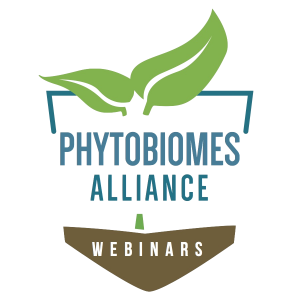 All webinars are free to attend and are scheduled at 11am Eastern, US Time. Recordings are posted subsequently to the Alliance YouTube channel. Subscribe to the channel to never miss an upload.
All webinars are free to attend and are scheduled at 11am Eastern, US Time. Recordings are posted subsequently to the Alliance YouTube channel. Subscribe to the channel to never miss an upload.
Upcoming webinar:
- 11 March 2021 – Genetic dissection of disease resistance mechanisms hijacked by a necrotrophic pathogen of wheat
Past webinars (since the last issue of the newsletter):
- Predictive biology: understanding and reversing the evolution of antibiotic resistance
- Holobionts and microbial flux within agri-food systems
- Circles H2020: Can natural microbiomes be exploited for more sustainable, safe, productive and nutritious food production?
- Managing nutrients as a system – 4R Nutrient Stewardship
Would you like to receive news and updates about events organized by the Alliance directly in your inbox? Register to the Alliance events mailing list.
Phytobiomes Conference

14-17 September 2021 – International Phytobiomes Conference
The organizers are keeping a close watch on COVID-19 vaccination efforts to ensure that we can go forward with the in-person conference in September 2021. To stay abreast of decisions regarding the conference, you can subscribe to the mailing list.
Upcoming phytobiome-related events
- 22-24 February 2021 – 5th Microbiome Movement – AgBioTech Summit 2021, virtual
- 3-4 March 2021 – Microbiome for Agriculture Congress: USA, virtual
- 9-10 March 2021 – World Agri-Tech Innovation Summit 2021, virtual
- 28-29 April 2021 – 3rd US Biostimulants Summit, Raleigh, NC, USA
- 12-14 May 2021 – 3rd Plant Microbiome Symposium, Dundee, Scotland, UK
- 28 June – 1 July 2021 – 1st International Plant Health Conference “Protecting Plant Health in a changing world”, Helsinki, Finland
- September 2021 (dates TBD) – Future Ag: Sustainable Goals , San Diego, CA, USA
- 5-8 September 2021 – ProkaGENOMICS – From Small Viruses to Complex Communities, Gottingen, DE
- 14-17 September 2021 – International Phytobiomes Conference, Denver, CO, USA
- 22-24 September 2021 – Plant Health, Agriculture & Bioscience Conference, The Hague, The Netherlands
- 2-5 May 2022 – miCROPe, Vienna, Austria
For updates, check the event calendar on the website.
If you are aware of an event on phytobiome-related topics and if that event is not listed on the website, please let us know.
In case you could not join us at an event, PDFs of the latest presentations made by the Alliance Leadership team are available on the website.
We developed a set of standards slides about phytobiomes, the Alliance, its goals and priorities. Contact us if you wish to receive those slides in PowerPoint format to add to your presentations.
Media Partnership:
5th Microbiome Movement – AgBioTech Summit 2021, 22-24 February 2021
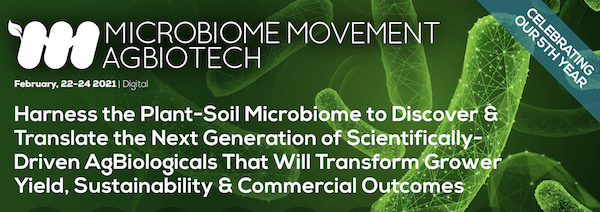
We are excited to be supporting the 5th Microbiome Movement – AgBioTech Summit taking place online this February 22-24. The meeting will unite the agricultural microbials community and will include representatives from agriculturally related strategy companies, biotechnology companies, solution providers, and academics with the goal of enabling the discovery and translation of the next generation of AgBiologicals that will transform grower yield, sustainability and commercial outcomes.
Join 50+ industry leaders, including Phytobiomes Alliance sponsors, Bayer Crop Science, Novozymes, Valent BioSciences, JoynBio, Pivot Bio, BioConsortia, and many more.
Phytobiomes Alliance members can benefit from an exclusive 15% discount by quoting the code IPBA15 or by contacting info@hansonwade.com.
Kellye Eversole, the Alliance executive director, is organizing a pre-conference workshop on Monday 21 February on the topic “Exploring the Importance of Developing Partnerships & How to Attract Funding to Your Research” and is moderating a session on regulatory issues on Wednesday 23 February.
Media Partnership:
Microbiome for Agriculture Congress: USA, 3-4 March 2021

Kellye Eversole, Executive Director of the Phytobiomes Alliance is speaking at the 2021 Microbiome for Agriculture Congress: USA, a virtual meeting.
Join us this March to:
- Examine the symbiotic relationships between microbes and plants through case studies in plant and soil microbiomes.
- Learn from academic and industry leaders who will share new research into the rhizosphere, phyllosphere and endosphere.
- Discover how the application of plant and soil microbiome research is improving disease resistance, nutrient acquisition and crop yield, and tolerance to multiple stressors including nematodes, insects and drought.
This meeting will be co-located with the 8th Plant Genomics & Gene Editing Congress: USA and the 5th Partnerships in Biocontrol & Biostimulants Congress: USA.
(If you are wondering how a virtual meeting can create great learning networking opportunities watch this video of a previous online event.)”
Members and supporters of the Alliance can claim a 15% discount with discount code pha15. The delegate pass gives access to all three collocated meetings.
Media Partnership:
World Agri-Tech Innovation Summit, 9-10 March 2021
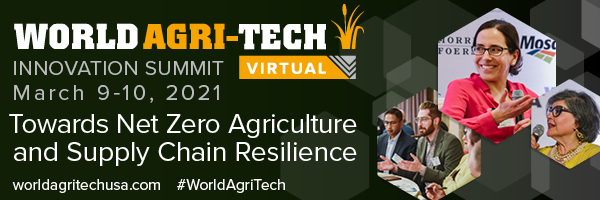
The Phytobiomes Alliance is pleased to be a partner for the World Agri-Tech Innovation Summit, a virtual event connecting the global agri-food ecosystem on 9-10 March 2021.
More than 60 international thought leaders will share critical intelligence around carbon sequestration, nutrient use efficiency, traceability, automation and digitization, while exploring new models to help build a sustainable and resilient agri-food system.
Watch the speakers present live in keynotes and panel debates before they host small group roundtable discussions on business-critical issues where you can tap deeper into their knowledge and share your own experiences with like-minded delegates.
Save a further 10% with Phytobiomes Alliance’s Discount Code: PHYTO10
Our Sponsors
The Phytobiomes Alliance is sponsored by Bayer Crop Science, Eversole Associates, INRAE, Novozymes, Valent BioSciences, Biovante, Colorado State University, Eurofins BioDiagnostics, Indigo, IRD, Joyn Bio, the University of Nebraska-Lincoln, NewLeaf Symbiotics, the Noble Research Institute, Penn State College of Agricultural Sciences, Pivot Bio, The Fertilizer Institute, the Waterloo Centre for Microbial Research, Aphea.Bio, BioConsortia, AIT Austrian Institute of Technology and Karyosoft.
